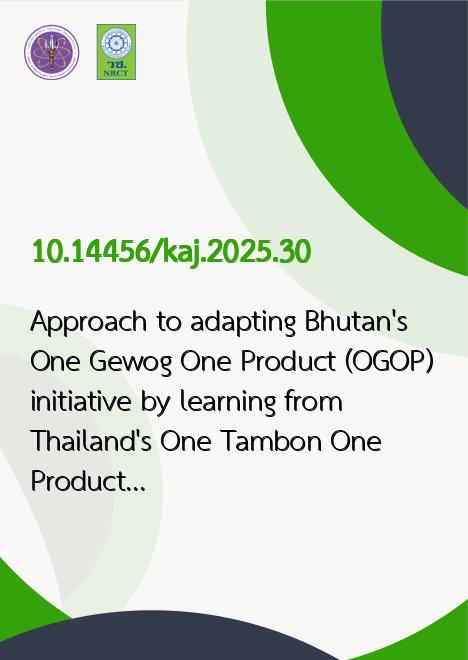
|
Approach to adapting Bhutan's One Gewog One Product (OGOP) initiative by learning from Thailand's One Tambon One Product (OTOP) model |
|---|---|
| รหัสดีโอไอ | |
| Creator | Naksit Panyoyai |
| Title | Approach to adapting Bhutan's One Gewog One Product (OGOP) initiative by learning from Thailand's One Tambon One Product (OTOP) model |
| Contributor | Jambay Lhamo, Manat Suwan, Watcharapong Wattanakul, Saiyud Moolphate, Choosit Choochat, Chutiwalanch Semmahasak |
| Publisher | Faculty of Agriculture |
| Publication Year | 2568 |
| Journal Title | Khon Kaen Agriculture Journal |
| Journal Vol. | 53 |
| Journal No. | 2 |
| Page no. | 416-428 |
| Keyword | Sufficiency Economy Philosophy, OGOP, OTOP, Well-being, Rural Development |
| URL Website | https://li01.tci-thaijo.org/index.php/agkasetkaj |
| Website title | Khon Kaen Agriculture Journal |
| ISSN | 3027-6497 (Online) |
| Abstract | This study evaluated the implementation of the Sufficiency Economy Philosophy (SEP) in Bhutan and Thailand and recommended adapting successful practices from Thailand’s One Tambon One Product (OTOP) model for Bhutan’s One Gewog One Product (OGOP) initiative. Data were collected from six Community Learning Centers (CLCs) in Bhutan and three OTOP businesses in Thailand through surveys, interviews, and focus group discussions. Respondents, primarily aged 30-50, showed differences in education levels, with 100% of Thai participants having completed formal education compared to 67% in Bhutan. Income reliance also varied, with only 26.7% of Bhutanese and 47% of Thai respondents depending solely on community products. Statistical analyses revealed that Thai farmers demonstrated a stronger understanding of SEP, which was reflected in higher well-being and economic outcomes (mean = 4.62 in Thailand vs. 3.68 in Bhutan, t-test = 7.612, P < 0.05). Bhutanese CLCs saw significant improvements in well-being after the project (P < 0.05), with scores increasing from 2.85 to 3.68. Despite these improvements, challenges remained in market access, capacity building, and product development. The study recommended strengthening government policies, enhancing training programs, improving market access, and promoting SEP for sustainable development in Bhutan’s OGOP project. Collaboration with private and international partners was also advised for long-term success. |
